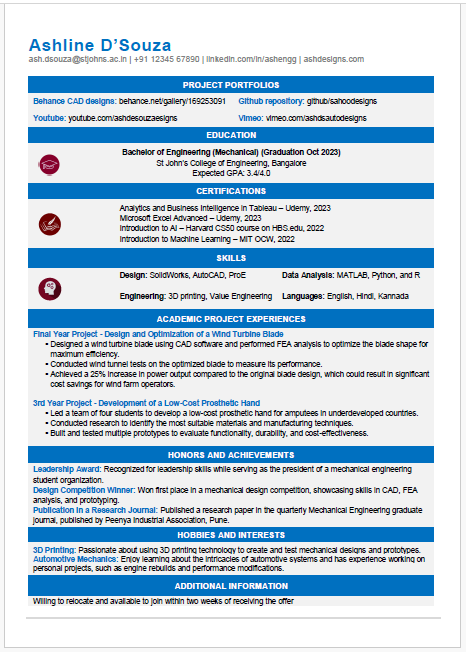Mechanical Engineer
Bachelor of Engineering (Mechanical)

About this template
This is a very professional resume which can significantly enhance your job prospects.
With its clean, modern design and industry-tailored layout, it highlights your skills and achievements, making a strong impression on recruiters.
Some most important technical skills for Mechanical Engineer
Here are some of the most important technical skills for a Mechanical Engineer, each explained briefly:
1. Computer-Aided Design (CAD):
Proficiency in CAD software like AutoCAD or SolidWorks is essential for creating detailed 2D and 3D models. This skill allows mechanical engineers to visualize, simulate, and optimize designs before physical prototypes are built.
2. Finite Element Analysis (FEA):
FEA is crucial for analyzing the structural integrity of components. This skill helps engineers predict how a product will react to forces, vibrations, heat, and other physical effects, ensuring safety and functionality.
3. Product Lifecycle Management (PLM):
PLM tools help manage the entire lifecycle of a product from inception through design, manufacturing, and disposal. Understanding PLM software ensures that projects are managed efficiently, with all stages of the product life cycle streamlined.
4. Knowledge of Manufacturing Processes:
Understanding various manufacturing processes such as machining, casting, welding, and additive manufacturing is vital. This knowledge ensures designs are not only innovative but also feasible to produce at scale.
5. Material Science:
Material science knowledge is crucial for selecting the right materials for different applications. This skill helps in optimizing product performance, durability, and cost-effectiveness by understanding the properties and behaviors of various materials.
6. Thermodynamics:
Thermodynamics is fundamental in mechanical engineering for analyzing energy systems, engines, and heat transfer processes. Mastery of this area ensures efficient design and operation of thermal systems like HVAC, engines, and turbines.
7. Project Management:
Project management skills are necessary for planning, executing, and overseeing engineering projects. Familiarity with tools like MS Project or Primavera and methodologies like Agile ensures projects are completed on time and within budget.
8. Quality Control and Assurance:
Ensuring that products meet quality standards is crucial. Skills in quality control, using tools like Six Sigma or ISO standards, ensure that the end product is reliable and meets regulatory and customer requirements.
9. Prototyping and Testing:
Prototyping and testing skills are important for validating designs. Experience with creating physical prototypes and conducting tests helps in identifying design flaws and making necessary adjustments before mass production.
10. Mechanical Systems Design:
Designing mechanical systems requires an in-depth understanding of mechanics, dynamics, and control systems. This skill ensures that systems are designed to operate efficiently, safely, and effectively in various environments.